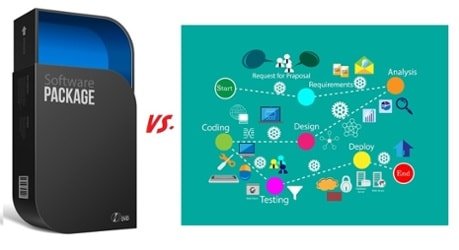- Purchase a completely custom system
- Purchase a packaged “out of the box” system
- Utilize an open source software system that can be partially customized with plug-ins and add-ons
Cost
Packaged Software
One of the major benefits of utilizing packaged software is that it typically has a lower cost than custom software. There are many popular business applications that are sold to a number of companies, so their selling price is lower compared to a custom system built just for you. When it comes to updates and enhancements to packaged software systems, most are available free of charge or at little cost to the user. If your company finds a packaged software system that can meet your needs, the lower cost may make it a worthwhile option to choose. “There are benefits to packaged software, if it matches a business’s requirements,” says Miles IT CEO Chris Miles. “If it can accomplish what you need without much workaround, then packaged software is a good direction because you’re not paying for the total cost of development.”Custom Software
 Because custom software is built for your unique business needs, it will often come with a higher cost than a packaged software system. Having a custom system built means being involved in the entire software development lifecycle, so every piece of the system should be something that is useful to your business. Purchasing a packaged system will likely involve paying for pieces of a system that you may never use. Updates and enhancements to a custom software system also come at a higher cost, but you have the ability to determine the types of enhancements you want.
Custom software will also likely have lower training costs because it is specifically designed around the core business processes your company is already implementing. Utilizing a packaged system may require committing more time and resources for training, because you may need to alter some business processes to fit the system.
Because custom software is built for your unique business needs, it will often come with a higher cost than a packaged software system. Having a custom system built means being involved in the entire software development lifecycle, so every piece of the system should be something that is useful to your business. Purchasing a packaged system will likely involve paying for pieces of a system that you may never use. Updates and enhancements to a custom software system also come at a higher cost, but you have the ability to determine the types of enhancements you want.
Custom software will also likely have lower training costs because it is specifically designed around the core business processes your company is already implementing. Utilizing a packaged system may require committing more time and resources for training, because you may need to alter some business processes to fit the system.
Productivity
Packaged Software
While evaluating the cost of a software system is important, it is also essential for businesses to evaluate a system in terms of productivity in order to help determine the ROI and value it will bring to them. One of the major benefits for packaged software systems is that they are built and implemented with standard best practices. While some small industry-specific software may be an exception, the majority of packaged business software applications are widely adopted by many users and have been thoroughly vetted, so you will be less likely to encounter initial errors within the system. While using a system built on standard best practices can have its benefits, the main downside is the system is not built for your individual business needs. If your company has a unique way of completing a business process that gives you a competitive advantage, you may lose that advantage if you alter your processes to fit a system based on a set of standards. “If a company has a business plan and business processes that are really good and unique, packaged software may make it difficult for them to follow those processes or implement that plan,” says Miles.Custom Software
 Unlike packaged software, custom software applications are built to handle your unique business requirements. The design process for a custom software system starts with identifying a problem or inefficiency, and then building a productivity solution in order to solve it. This means that the system will follow your processes the exact way you want it to. “With a custom system, businesses get to design it to do the processes the way they want and the business plan the way they have it written as opposed to following someone else’s ideas on how things should work,” Miles says. If your company uses multiple software systems, custom software applications can also include custom integrations to ensure your systems all communicate well together.
One of the potential downsides of building a system around your unique processes is the negative impact it can have if your processes themselves are not well-designed. “If you don’t have good processes or a good business plan, and you build custom software around that, it doesn’t actually help you,” Miles says. “It may even accelerate the bad business plan or processes.” Similarly, a poorly designed system can also hinder your business productivity, so you must ensure the company or individual who designs the system knows how to build it well. Unlike a packaged software application that has been tested and vetted by many users, a custom application is being built from the ground up for you, therefore vendor selection is that much more important.
Choosing a business software system to run all or part of your business requires a thorough amount of research and planning. Be sure to weigh your options carefully. You want to take cost into account, but ultimately it is about determining what type of system will best fit your business’s needs.
Have any further questions about the benefits of packaged and custom software? Our business software experts have experience designing custom systems as well as creating and implementing packaged systems. Don’t hesitate to contact us today!
Unlike packaged software, custom software applications are built to handle your unique business requirements. The design process for a custom software system starts with identifying a problem or inefficiency, and then building a productivity solution in order to solve it. This means that the system will follow your processes the exact way you want it to. “With a custom system, businesses get to design it to do the processes the way they want and the business plan the way they have it written as opposed to following someone else’s ideas on how things should work,” Miles says. If your company uses multiple software systems, custom software applications can also include custom integrations to ensure your systems all communicate well together.
One of the potential downsides of building a system around your unique processes is the negative impact it can have if your processes themselves are not well-designed. “If you don’t have good processes or a good business plan, and you build custom software around that, it doesn’t actually help you,” Miles says. “It may even accelerate the bad business plan or processes.” Similarly, a poorly designed system can also hinder your business productivity, so you must ensure the company or individual who designs the system knows how to build it well. Unlike a packaged software application that has been tested and vetted by many users, a custom application is being built from the ground up for you, therefore vendor selection is that much more important.
Choosing a business software system to run all or part of your business requires a thorough amount of research and planning. Be sure to weigh your options carefully. You want to take cost into account, but ultimately it is about determining what type of system will best fit your business’s needs.
Have any further questions about the benefits of packaged and custom software? Our business software experts have experience designing custom systems as well as creating and implementing packaged systems. Don’t hesitate to contact us today! 

